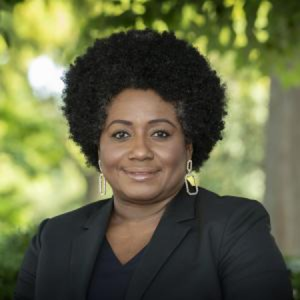Co-Opting AI: Crime
NYU’s Institute for Public Knowledge, Sloane Lab, and the Karsh Institute of Democracy at the University of Virginia invite you to a new discussion in the series “Co-Opting AI.” This will be a completely virtual event.
Please register here.
This event will discuss how AI-driven predictive technologies intersect with law enforcement and the social framing of “crime” more generally.

Renée Cummings, a 2023 VentureBeat AI Innovator Award winner, is an artificial intelligence (AI), data, and tech ethicist, and the first Data Activist-in-Residence at the University of Virginia’s School of Data Science, where she was named Professor of Practice in Data Science. She also serves as co-director of the Public Interest Technology University Network (PIT-UN) at UVA. She is also a nonresident senior fellow at The Brookings Institution and the inaugural Senior Fellow, AI, Data and Public Policy at All Tech Is Human, a leading think tank. She’s also a distinguished member of the World Economic Forum’s Data Equity Council and the World Economic Forum’s AI Governance Alliance, an advisory council member for the AI & Equality Initiative at Carnegie Council for Ethics in International Affairs, and a member of the Global Academic Network at the Center for AI and Digital Policy. Professor Cummings is also a criminologist, criminal psychologist, therapeutic jurisprudence specialist, and a community scholar at Columbia University.
 Max Isaacs is a Senior Staff Attorney with the Policing Project. His work focuses on new and emerging policing technologies and their implications for civil rights, civil liberties, and racial justice. Prior to joining the Policing Project, Max clerked for Judge Diana Gribbon Motz of the Fourth Circuit Court of Appeals and Judge Lorna G. Schofield of the Southern District of New York. He also served as a civil rights fellow at Lambda Legal Defense and Education Fund. Max graduated magna cum laude from New York University School of Law where he was a member of the Law Review. He also holds a Bachelor of Music degree from the Conservatory of Music at Purchase College.
Max Isaacs is a Senior Staff Attorney with the Policing Project. His work focuses on new and emerging policing technologies and their implications for civil rights, civil liberties, and racial justice. Prior to joining the Policing Project, Max clerked for Judge Diana Gribbon Motz of the Fourth Circuit Court of Appeals and Judge Lorna G. Schofield of the Southern District of New York. He also served as a civil rights fellow at Lambda Legal Defense and Education Fund. Max graduated magna cum laude from New York University School of Law where he was a member of the Law Review. He also holds a Bachelor of Music degree from the Conservatory of Music at Purchase College.

Dillon Reisman is a staff attorney at the American Civil Liberties Union of New Jersey, where he spearheads litigation and advocacy at the intersection of civil rights, artificial intelligence, and other new technologies. His docket includes work on due process and public benefits, facial recognition and surveillance, and data privacy. He first joined the ACLU-NJ in 2021 as a Skadden Fellow to address how the use of artificial intelligence and automated decision systems by state government affects the rights of New Jersey residents and to examine how algorithms perpetuate systemic inequities. Dillon received his bachelor’s degree in Computer Science from Princeton University and his law degree from New York University. While in law school, Dillon worked in the Racial Justice Clinic, where he represented incarcerated women fighting for their right to practice their religion, and the Technology Law and Policy Clinic, where he represented advocacy organizations fighting against the use of flawed and biased technology in the criminal legal system. He also interned for Chief Judge Colleen McMahon of the Southern District of New York and the ACLU-NJ. He was a Notes Editor on the NYU Law Review and co-founder of Rights Over Tech, a student group working for civil and human rights in the face of harmful forms of technology. Before law school, Dillon was a software engineer on Google’s privacy team and later a research engineer at the Princeton Center for Information Technology Policy and the AI Now Institute. As a technologist, Dillon published research in data privacy, artificial intelligence, and policy advocacy.
Mona Sloane, Ph.D., is an Assistant Professor of Data Science and Media Studies at the University of Virginia (UVA). As a sociologist, she studies the intersection of technology and society, specifically in the context of AI design, use, and policy. She also convenes the Co-Opting AI series and serves as the editor of the Co-Opting AI book series at the University of California Press as well as the Technology Editor for Public Books. At UVA, Mona runs Sloane Lab which conducts empirical research on the implications of technology for the organization of social life. Its focus lies on AI as a social phenomenon that intersects with wider cultural, economic, material, and political conditions. The lab spearheads social science leadership in applied work on responsible AI, public scholarship, and technology policy. More here: monasloane.org.
The Co-Opting AI event series is convened by Mona Sloane. It is hosted by NYU’s Institute for Public Knowledge, UVA’s Karsh Institute of Democracy, and Sloane Lab.